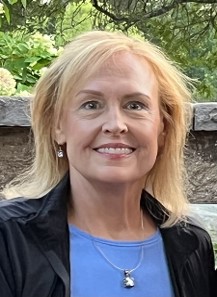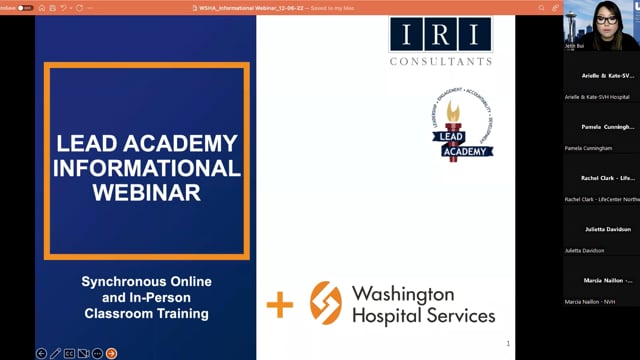Workforce
Healthcare Management Training
In today’s dynamic healthcare landscape, successful management requires more than technical and subject matter expertise alone. You can enhance your team’s potential with management training that is based on the latest evidence and also focused on the tactics of leading people in healthcare.
Comprehensive training options allow participants to explore communication styles and learn how to control emotions and transition from a peer to a leader. Management training should include basics such as how to coach and run meetings, but also provide exposure to profit and loss statements and corporate policies. It should allow plenty of time to practice new skills in a safe setting and to share their successes and challenges with other participants to accelerate learning.

Set your new managers up for success by making LEAD Academy a part of their leadership development journey.
LEAD Academy offers a comprehensive and engaging modular training that focuses on building and strengthening key leadership competencies. Learn how to manage and resolve interpersonal conflicts and how to have impactful coaching conversations with your employees.
LEAD Academy is an intensive 12-module training experience using innovative tools and experiential learning to empower recently hired, newly appointed or previously untrained health care leaders to better understand and use their strengths. Designed for health care supervisors and managers, LEAD is built on the underlying principle that effective leadership requires productive relationships to support excellence in patient care, sustainable business objectives and a safe patient environment.
LEAD Academy sessions provide a safe environment to practice newly learned skills and align work goals and actions to support the broader vision of the organization. Engaging activities guide participants through the process of understanding differing leadership styles and overcoming the distinct challenges of being a leader. Specific program focus areas include:
- Self-development
- Supporting the development of others
- Managing and developing a successful organization
At the conclusion of the LEAD Academy, participating health care managers will be able to:
- Improve the performance of the people and groups that report to them
- Enhance their contribution to the achievement of facility and system objectives
- Increase their own self-management skills during every day and stressful situations
Module 1 – From Peer, to Manager, to Leader
- Understand the differences between manager and leader and why it matters.
- Learn the four stages of learning and why it matters to leadership and employee development.
- Know three foundational principles of leadership behavior and how they work on the job.
- Emphasize the role of the leader in balancing resources.
- Share and learn new ideas for engaging people in resource utilization.
- Learn four leadership strategies and how they apply to your job.
Module 2 – Leading People Differently
- Know how and why different people approach tasks and relationships differently (DiSC).
- Understand how your own behavior is influenced by preferences.
- Develop improved relationships with employees who have a different “style”.
- Influence people with whom you have been challenged in the past.
Module 3 – Leadership Communication Best Practices
- Successfully use the three communication cues that impact understanding.
- Use interpretive listening to help employees and colleagues understand the reason for communication.
- Know where nonproductive communication games come from.
- Create a personal strategy to avoid unintentionally starting or getting hooked by communication games.
Module 4 – Resolving Interpersonal Conflict
- Identify common sources of conflict.
- Choose between five options for responding to conflict at the source based on the risks and benefits of each.
- Adjust your preferred style for responding to conflict to achieve a productive outcome.
- Facilitate and engage in a conversation focused on successful conflict resolution when resolving conflict for yourself or when mediating conflict with others.
Module 5 – Coaching Employees to Higher Performance
- Learn the difference between coaching and advising.
- Adapt your coaching approach based on the person, the situation and the desired outcome.
- Conduct spot coaching or plan and facilitate coaching meetings for improved or higher performance.
- Increase employee performance as a result of intentionally structured conversations.
Module 6 – Leading Others Through Change
- Describe natural responses to day-to-day and event-based change.
- Predict employees’ and others’ responses to day-to-day and event-based change.
- Use leadership and communication skills to help employees and others work through issues arising from change
- Keep and adapt gentle pressure toward successful change
Module 7 – Building and Leading Effective Teams
- Know the four behavioral stages of team development and why they matter.
- Practice using a tool to help clarify the team’s purpose and ensure a “What’s In It For Me” (WIIFM) for all team members.
- Learn a tool to identify and build on each team member’s knowledge, skill, experience, and interpersonal style to strengthen a sense of interdependence.
- Review a process strategy that supports positive team engagement and cooperation.
- Use a Team Health Audit to measure, track, and report team performance for continuous team development.
Module 8 – Planning and Running Effective Meetings
- Plan and open outcome-oriented meetings.
- Use different processes for different meetings.
- Manage meeting processes and behaviors.
- Close meetings to enhance understanding, agreement and action.
- Follow-up on meetings to provide maximum benefit.
Module 9 – Managing Performance
- Identify current performance management challenges and how you manage them now.
- Create an effective performance goal and explain why it matters.
- Observe employee performance and describe it objectively.
- Reduce your own rater biases in evaluating performance and providing feedback.
- Learn the six essential steps to a successful performance conversation.
Module 10 – Organizing Your Time, Work and Priorities
- Assess your daily and weekly work schedules to ensure tasks align with goals and priorities.
- Identify and manage personal habits that contribute to time wasters, procrastination, or indecision.
- Assess and strengthen relationships with others to support time management goals and objectives.
- Assess and organize your workspaces and stuff to remove barriers to time management.
Module 11 – Why and How of Organizational Policies
- Explain the dynamics that drive organizational behavior in healthcare that influences organizational culture.
- Create policies that establish or reinforce the desired organizational culture.
- Interpret and communicate organizational policies and ensure understanding and buy-in to increase compliance.
- Administer and reinforce organizational policies.
Module 12 – Business and Finance for Today’s Health Care Leader
- Know the words and phrases used in a basic hospital financial statement.
- Know how statistics and key ratios tell the story of a hospital’s financial health.
- Describe how leaders’ business decisions are driven by financial data.
- Explain how your day-to-day decisions can impact your hospital’s financial health.
- Describe how to help your team understand how their decisions impact your hospital’s financial health.
Weekly sessions are online from 9:00 – 11:30 AM on Thursdays.
Cohort 1
April 3 – June 19, 2025
Cohort 2
September 4 – November 20, 2025
$2,375 per person.
Group discounts are available for 3+ attendees.
Program fee includes course materials and a certificate of completion.
A digital Certificate of Completion will be awarded to participants upon successful completion of the program. Successful completion of the program will be based on attendance of virtual sessions.
LEAD Academy Info Session
Wednesday, March 5, 11:00 – 11:45 AM
 Pamela Cunningham
Pamela Cunningham
Pamela Cunningham CSSBB, MCC, is a lead designer and instructor for both the LEAD Academy and Advanced LEAD Academy. Pam has over thirty years of experience responsible for getting business results and developing leaders and is skilled at blending the technical with the human side of high performance. A highly regarded master facilitator, Pam has conducted organizational strategic planning, leadership development, brand management and sales effectiveness training for manufacturing, information technology, retail and financial services industries around the world.
For the past eighteen years Pam has focused her knowledge, skills and experience on private- and public-sector health care organizations including many hospitals and healthcare systems in the Midwest and on the West Coast. As a consultant and certified coach, she has advised hospital executives on how to quickly and effectively resolve various organizational issues on performance management systems, change methodologies and implementation, root cause analysis and problem solving and recruiting and retention costs and strategies. An engaging and effective communicator, Pam has been asked to present on a variety of leadership and current topics at conferences across the country.
 Monique Gutierrez
Monique Gutierrez
Monique Gutierrez brings 8 years of experience in organizational and leadership development, change management, and labor relations. She studied organizational development in graduate school and is currently working on her PhD in Business Psychology. Her wealth of knowledge also includes a strong background in project management, group facilitation, employee opinion surveys, and corporate needs analysis. She has conducted management training for leaders at all levels within organizations in the healthcare, manufacturing, logistics, and hospitality industries. Monique also has experience in coaching leaders on managing employee engagement, performance management, and employee relations issues.
